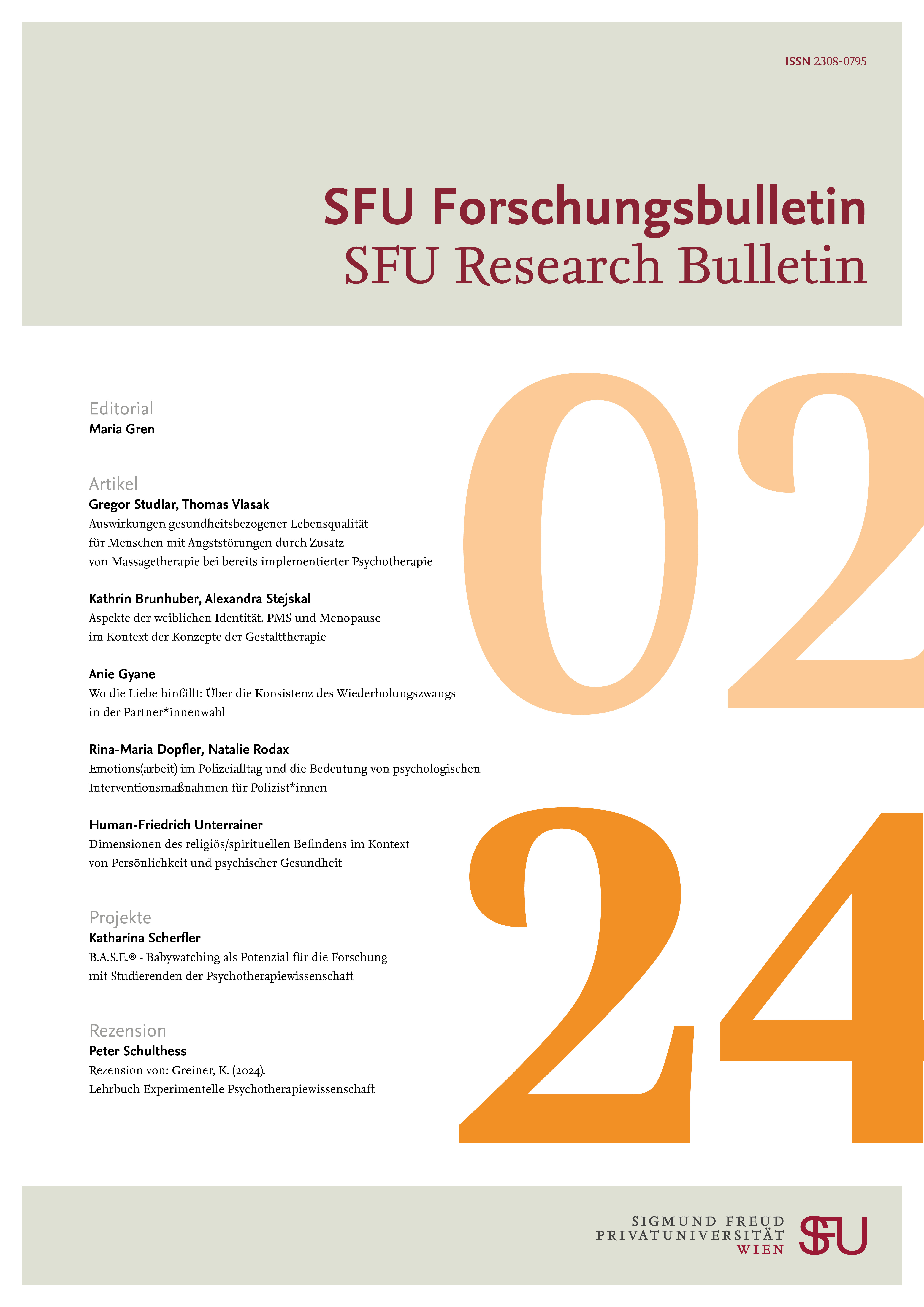Emotions(arbeit) im Polizeialltag und die Bedeutung von psychologischen Interventionsmaßnahmen für Polizist*innen
DOI:
https://doi.org/10.15135/2024.12.2.46-61Abstract
The study explores the question of which (emotional) needs from the everyday work of police officers need to be discussed more explicitly in order to be able to set up targeted psychological interventions. We present a qualitative pilot study by means of four narrative expert interviews with German male police officers between the age of 25 and 65. The analysis using documentary methods reveals when and how emotional needs come into play in police work. Furthermore, we show forms of psychological intervention that can adequately address emotional needs, and discuss which desiderata result from inadequate psychological intervention. The article aims at understanding the subtle nuances of everyday work life and developing an understanding of the specificity of police work for psychologists.
References
Bartmann, M. (2017, 22. Juli). Als der Schrecken nach München kam. Br. Abgerufen am 14. April 2021 von https://www.br.de/nachricht/oberbayern/inhalt/amoklauf-oez-jahrestag-rueckblick100.html
Bernstein, N. 2020). Der Anti-Stress Trainer für Polizisten (1. Aufl.). Springer. https://doi.org/10.1007/978-3-658-12475-5
Bohnsack, R., Nentwig-Gesemann, I. & Nohl, A.-M. (Hrsg.). (2013). Die dokumentarische Methode und ihre Forschungspraxis. Grundlagen qualitativer Sozialforschung (3. Aufl.). Springer. https://doi.org/10.1007/978-3-531-19895-8
Bohnsack, R. (2019). Rekonstruktive Sozialforschung: Einführung in qualitative Methoden (11. Aufl.). UTB.
Hochschild, A. R. (1979). Emotion work, feeling rules and social structure. The American Journal of Sociology, 85(3), 551-575. https://doi.org/10.1086/227049
Hochschild, A. R. (1990). The managed heart: Commercialization of human feeling (2nd ed.). University of California Press.
Klemisch, D. (2006). Psychosoziale Belastungen und Belastungsverarbeitung von Polizeibeamten [Dissertation]. Wilhelms-Universität Münster.
Lasogga, F. (2017). Krisenbewältigung und Möglichkeiten der Prävention bei Einsatzkräften. In B.
Badura, A. Ducki, H. Schröder, J. Klose & M. Meyer (Hrsg.), Fehlzeiten-Report (S.77-86). Springer. https://doi.org/10.1007/978-3-662-54632-1_7
Lehmann, L. (2020). Bodycam – Argumentationslinien in Deutschland. In D. Hunold & A. Ruch (Hrsg.), Polizeiarbeit zwischen Praxishandeln und Rechtsordnung (S.23-37). Springer.
https://doi.org/10.1007/978-3-658-30727-1
Mannheim, K. (1980). Strukturen des Denkens. Suhrkamp.
Nohl, A-M. (2009). Interview und dokumentarische Methode (3. Aufl.). Verlag für Sozialwissenschaften.
Przyborski, A. & Wohlrab-Sahr, M. (2014). Qualitative Sozialforschung: Ein Arbeitsbuch (4. Aufl.) Oldenbourg.
Ruland, I. (2017). Von der Ilias nach Bad Aibling – oder: Warum ein Vorgesetzter etwas von Psychotraumatologie verstehen sollte. In J. Stierle, D. Wehe, & H. Siller (Hrsg.), Handbuch Polizeimanagement (S. 535-573). Springer. https://doi.org/10.1007/978-3-658-08926-9
Szymenderski, P. (2012). Gefühlsarbeit im Polizeidienst. Wie Polizeibedienstete die emotionalen Anforderungen ihres Berufs bewältigen. Transkript.
Weber, P. (2017). Coaching bei der Polizei. In J. Stierle, D. Wehe, & H. Siller (Hrsg.), Handbuch Polizeimanagement (S. 391-403). Springer. https://doi.org/10.1007/978-3-658-08926-9
Zapf, D., Seifert, S., Mertini, H., Voigt, C., Holz, M., Vondran, E., Isić, A., & Schmutte, B. (2000). Emotionsarbeit in Organisationen und psychische Gesundheit. In H.-P. Musahl, H.-P. & T. Eisenhauer (Hrsg.), Psychologie der Arbeitssicherheit. Beiträge zur Förderung von Sicherheit und Gesundheit in Arbeitssystemen (S. 99–106). Asanger.
Downloads
Published
Issue
Section
License
The reproduction of articles published in any form is allowed under the condition that the citation is comprehensive. Prints in other publication media or public media require the written consent of the editor and can be requested under: forschung@sfu.ac.at
